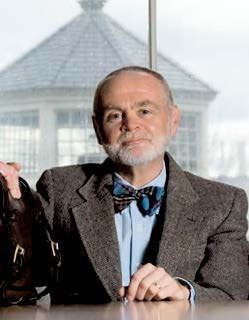Mark W. Anderson
 Contact Information Contact InformationEmail: marka@maine.eduResearch Interests Sustainability Science Knowledge to Action Ecological Economics Recreation and Land Management Environmental Impact Assessment Higher Education Assessment Degrees University of Maine, M.S. (Agricultural and Resource Economics) Bowdoin College, A.B. (Government) |
Emeritus faculty, School of Economics, University of Maine
Faculty Fellow, Senator George J. Mitchell Center for Sustainability Solutions Profile Anderson’s research with the Mitchell Center included understanding how underlying values affect individual and group responses to sustainability. He also studies how environmental education impacts the development of those values. Another aspect of Anderson’s research is to transform the concept of sustainability beyond the Brundtland definition of “development that meets the needs of the present without compromising the ability of future generations to meet their own needs,” to a more practical definition. This new concept could potentially provide an operational definition for sustainability. His research has been funded by the National Science Foundation, Maine Department of Environmental Protection, Maine Water Resources Research Institute, Maine Forest Service, Sea Grant, Maine EPSCoR, and the Senator George J. Mitchell Center. Anderson has been published in several peer-reviewed journals including Ecological Economics, Sustainability Science, Sustainability, Environmental Education Research, Journal of General Education, Land Use Policy, Maine Policy Review, and Technological Forecasting and Social Change. He co-authored the book Life Extending Technologies: A Technology Assessment with Theodore J. Gordon and Herbert Gerjuoy. Selected Publications Mark W. Anderson, Mario Teisl, Caroline Noblet, and Sharon Klein, “The Incompatibility of Benefit-Cost Analysis with Sustainability Science,” Sustainability Science (forthcoming). Mark W. Anderson, “Intergenerational Bargains: Negotiating Our Debts to the Past and Our Obligations to the Future,” Futures 54 (2013): 43-52 Caroline Noblet, Mark W. Anderson, and Mario Teisl, “An Empirical Test of Anchoring the NEP Scale in Environmental Ethics,” Environmental Education Research 19, no. 4 (2013): 540-551. Mark W. Anderson, Mario F. Teisl, and Caroline Noblet, “Giving Voice to the Future in Sustainability Science: Retrospective Assessment to Learn Prospective Stakeholder Engagement,” Ecological Economics 84 (2012): 1-6. Mark W. Anderson, Caroline Noblet, and Mario Teisl, “Our Environment: A Glimpse at What Mainers Value,” Maine Policy Review 21, no. 1 (2012): 104-110. Mario Teisl, Mark W. Anderson, Caroline Noblet, George K. Criner, Jonathan Rubin, and Timothy Dalton, “Are Environmental Professors Unbalanced? Evidence from the Field,” Journal of Environmental Education 42, no. 2 (2010): 67-83. Theodore J. Gordon, Herbert Gerjuoy, and Mark W. Anderson, Life Extending Technologies: A Technology Assessment (New York: Pergamon Press, 1980). Reports and Encyclopedia Articles: Mark W. Anderson, Kevin J. Boyle, Kathleen P. Bell, and John Holden, Procedures for Evaluating the Potential Regional Economic Impacts of Conservation Lands in the 100-Mile Wilderness Region (Final Report to the Maine Department of Conservation, 2005). Mark W. Anderson, Issues to be Considered in Estimating the Effects on Primitive Recreation of the Plum Creek Concept Plan for the Moosehead Region (Report to Maine Land Use Regulation Commission, 2006). Mark W. Anderson and Mario Teisl. “Values,” in Berkshire Encyclopedia of Sustainability: Vol. 10 The Future of Sustainability (2012). Mark W. Anderson. “Economics, Steady State,” in Berkshire Encyclopedia of Sustainability: Vol. 10 The Future of Sustainability (2012). |
